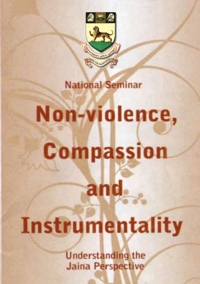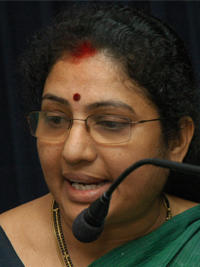 | Non-violence, Compassion and InstrumentalityA Jaina PerspectiveSeminar organized by the Department of Jainology of the University of Madras, 13 and 14 February 2009 Chennai, India |
14.02.2009
2.09 Nimitta and Upādāna - A Dialogue
Performed by Abhilasha and Dimple, Students of the Dept. of Jainology, University of Madras
Introduction
The world has been created by God, without His wish not even a leaf will flutter - so say some. I am the doer; I can do anything and everything. It is my will that makes the world the way it is. Some opine that everything is predetermined. Whatever is to happen will happen. So eat, drink, enjoy and make merry and don't worry about tomorrow. Still some believe that the time factor is the most important one. It is only time that makes a seed grow into a tall tree and bear colorful flowers and tasty fruits. If the seed did not have the nature to sprout and grow, what would have been the role of time? So time is not everything. If a substance has the capacity in it then why does a person need external help, guidance, etc?
So friends, who is the real creator? Who is responsible for what happens in the world? Who will enlighten us? So let us go and listen to what Nimitta and have to say.
Nimitta: I am the instrumental cause. Like a teacher is instrumental in teaching the student.
: I am the material cause. The student has the potential to study; this potential is the material cause.
Nimitta: I am very powerful, I am the doer, I am everything. Without me nothing can happen in this world. If I am not there, how will a pot be made? If I am not there how will a student study? So I am the most important one.
: Calm down, just chill, don't be arrogant. Look all scholars are here, don't blow your own trumpet. If you are everything then why is the world in such a mess? Go and put everything in order; make the unhappy people happy. Make the ignorant wise; make the poor rich; make the world free of terror, free of violence. How can you claim that you are everything? Nimitta: Look, I have got my limitations, but I am very important.
: There you are! You better know your limitations. Let us understand each others role. I will listen to you and you listen to me - this is the principle of Anekāntavāda - let us understand each other's perspective because reality is multi-faceted.
Nimitta: My role is such! So I will have to be a little harsh. So please bear with me. Today I heard an inspiring lecture from an enlightened teacher. He said that there can be no knowledge without a teacher. If we also find a wise teacher, I think we can also attain salvation easily.
: No my dear friend, no! This is not true.
Nimitta: Okay, I agree with you that the instrument by which something is done is not the actual cause, but I want to ask you, why are you wearing those dirty glasses on that funny nose? Just because it helps you to see everything clearly. The same way, I, Nimitta, say that I am the cause of any event.
: Even a small child can tell that one cannot acquire knowledge through glasses. If it is so, put it on the table, put it on the wall or make a blind man wear it, then they must also be able to see. But the truth is that they can not see. This proves that knowledge is not acquired through glasses; intact knowledge can be acquired only through knowledge.
Nimitta: Of course, glasses can not give knowledge but a teacher certainly can. My dear friend, did you become a graduate after learning from your teacher or this was an inborn talent in you? So do you have any answer for this?
: Before answering your questions, I would like to ask you that who all studied with you? Who were your classmates?
Nimitta: Hmmm, in my class Bholu studied who is a watchman today, Rajesh became an industrialist, but later on caught for a fraud. Suresh became a corrupt politician and another student Ashok became a Minister. As of now I remember only these people.
: 0 now I would like to ask you, why Bholu became a watchman and not a graduate? Why are you just a graduate and not a Doctor? Why Rajesh became a criminal and not Prime Minister. Did your teacher keep any difference amongst you people while teaching?
Nimitta: No, didn't Bholu became a watchman because he funked in all the exams. Rajesh became a graduate, but he misused his knowledge and Suresh - what to talk of him, I have not seen such a person, he became very power hungry! So he discontinued his studies. Ashok became a Minister because he was interested in social service.
: All I want to say is that these people ended up in different professions according to their abilities and destinies. There are so many factors that play a role in determining our future.
Nimitta: Okay Okay... Now I am presenting a strong proof related to the life of Tīrthaṅkaras which will prove that I am very powerful. During the end of the 3rd Era, when Lord Rishabh was King of Ayodhyā, one day the court dancer Nilanjana was dancing before him, she suddenly fell down and breathed her last. This incident inflamed the spirit of detachment in the life of Lord Rishabh and he renounced the world and second proof is of the period, when Lord Nemināth's marriage procession was moving towards Junagarh. On the way, he heard the cry of innocent animals. On hearing this Lord Nemināth became detached and renounced the world. Now, my dear friend I want to ask you that was not the death of Nilanjana the reason for lord Rishabh's detachment? Was not the cry of innocent animals the reason for Lord Nemināth's detachment? Yes, these incidents were the reason, that's why I am saying that Nimitta is the doer of the work. Now can you prove my evidences to be false?
: Your evidence still does not prove that Nimitta is the doer of the work; in fact these evidences also prove the victory of. If Nilanjana's death was Lord Rishabh's detachment, there the question arises: why didn't everyone else sitting in the court of king Rishabh get detached? And we see many people dying everyday then why don't we get detached? As far as the cry of innocent animals is concerned, all the people who took part in the marriage procession also heard the cry of animal, but they never renounced the world. Do you have any answer for this? As I can see, your silence gives a hint of your failure.
Nimitta: I think you are mistaken my friend. I have not failed; I still have very strong evidence that can prove that Nimitta is the doer of the work. Now tell me who makes the pot? The whole world knows the potter makes the pot; the clay itself cannot become a pot.
: If the potter makes pot, then call your potter and ask him to make a pot here.
Nimitta: Are you kidding, can a pot be made without clay?
: Okay, I will bring sand from Marina Beach, asks your potter to make the pot.
Nimitta: No, no, the pot can only be made of clay, not sand.
: So the clay is the material cause. It has the potential to be transformed into a pot. That potential in the clay is i.e. without potential nothing can be done, however powerful the Nimitta be. So my dear friend, open your eyes to reality.
Nimitta: Tell me now; an ant dies because of its ayu karma or because of the instrumental cause?
: Of course, it dies because its ayu karma is exhausted.
Nimitta: If that is the case then why is the Nimitta punished? Kasab is the lone survivor in the Mumbai attacks 26/11. Look at what he is undergoing.
: The Nimitta is punished because his thoughts and dispositions were harmful for the society. To maintain a social order the Nimitta is tried by law. So both Nimitta and along with many other factors go to determine the cause and effect of any happening. I hope you have understood.... You better understand.
Nimitta: If are everything, then what is my role?
: Look friend I am also not everything. I also have my limitations, but I hope you have understood that in Jainism we have to understand everything relatively, you are also important and I am also important. I cannot play your role and you cannot play my role. This is the anekānta viewpoint. We should not be arrogant and proud about our roles, but understand reality from different angles.
Conclusion:
We have understood the importance of both Nimitta and. Let us not fight the way they are fighting. We have understood what Lord Mahāvīra meant, that when it comes to ourselves, is important and when it comes to serving others it is the Instrumental cause.


 Sasilekha Sunil
Sasilekha Sunil